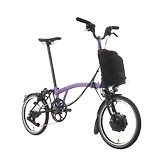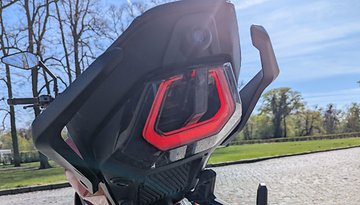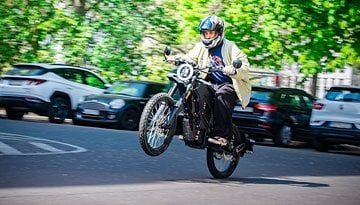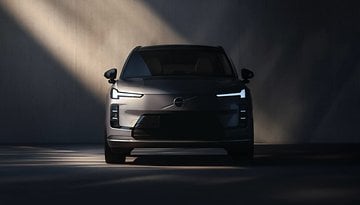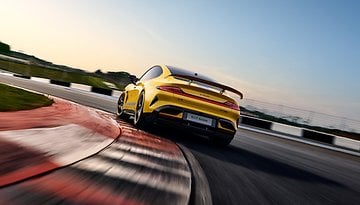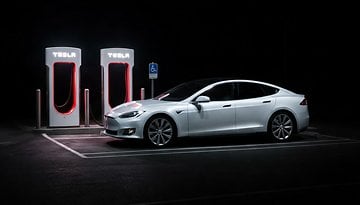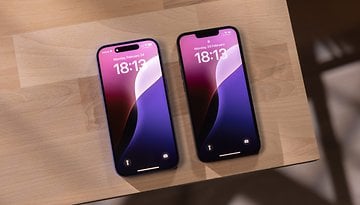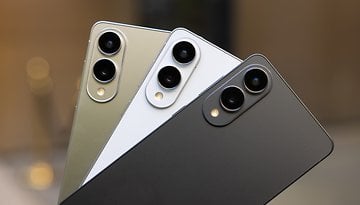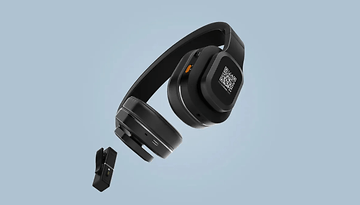Brompton Electric P-Line Review: 1.6 kg Lighter But More Expensive
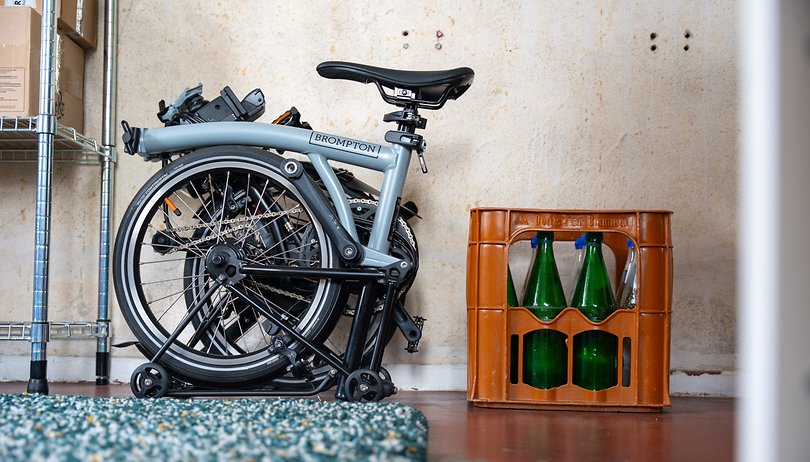

If you want to buy an electric folding bike from Brompton, you will have a difficult decision on your hands. Do you need a more compact model from the P-Line or do you want to build some more muscle with the C-Line? After reviewing the C-Line some time back, we now look at the more compact Brompton Electric P-Line in 2024. Is the extra 1.6 kg weight reduction worth it?
Good
- Fun riding experience thanks to its 250 W motor
- Weighs just 16.3 kg
- Well thought-out folding mechanism
- Removable battery with a 70km range
Bad
- Lightweight saddle is not particularly comfortable
- Companion app has very few functions
- Expensive overall with highly-priced accessories
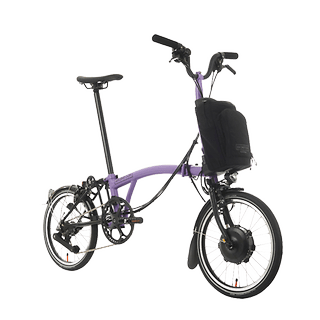
In a nutshell
By using titanium in the rear frame, a lighter saddle, and other optimizations, Brompton has reduced the weight of the electric P-Line by a further 1.6 kg. As a compromise, you will have to live with a higher price tag and a stronger feeling of pressure when seated. Overall, however, the P-Line is one of the best folding e-bikes on the market.
Design & build quality
Some time ago, Brompton introduced the P-Line, the lightest e-folding bike in its line-up. Depending on the variant, you only have to lug around 15.9 to 17.3 kg up the stairs or other obstacles on your way to work. The rear frame is made from titanium and our review e-bike came with a practical luggage rack. This also allows the e-bike to be folded for easier transportation.
Pros:
- Lightweight at just 16 kg.
- High-quality workmanship and durable materials.
- Practical luggage rack with additional wheels.
Cons:
- Imbalanced when folded.
- Clip pedals are more impractical than foldable versions of the C-Line.
For my review, I visited the new "Brompton Junction" in Berlin, where all of the manufacturer's available folding bike models were on display. Since the manufacturer emphasizes harmonious product design, it is very difficult to tell one electric model from the other. However, the P-Line has slightly more refined mudguards and bears a discreet "P" at the top of the frame.
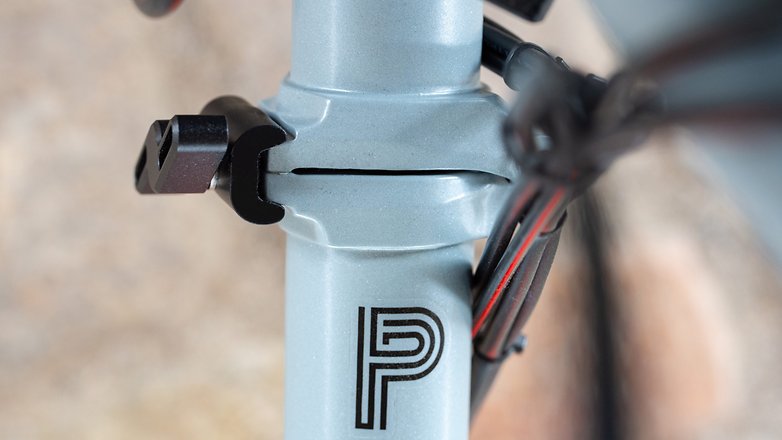
Despite the very similar design, Brompton managed to make the "P-Line" models shed some weight. In our configuration with a pannier rack, 12-speed gearbox, and "mid handlebars", the e-folding bike weighs exactly 16.3 kg. The C-Line model we reviewed a few years ago tipped the scales at 17.4 kg and was extremely light for an e-folding bike, even at this weight.
The folded dimensions of both bikes measure 64.5 x 57 x 27 cm (H x W x D), which means nothing has changed in terms of the compact dimensions. This translates to both bikes not taking up much space under desks in the office or on the luggage rack when riding commuter trains. Thanks to the folding mechanism, you might be able to carry this e-bike on certain forms of public transportation for free.
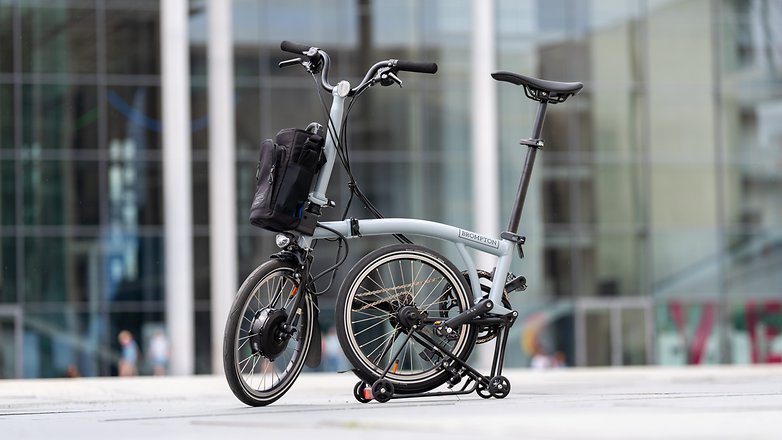
The model that Brompton provided us with for this review also features the "Advance Roller Frame", i.e. a luggage rack where four rollers are attached. When folded, you can still transport the bike comfortably and use the extended saddle as a handlebar. This system is really useful and is one of the highlights of Brompton bikes, of which you need to pay a surcharge for it. Furthermore, this leaves the weight distribution is a little unbalanced. I was always concerned the e-bike would tip over to the right when moving.
Another special feature in our model is a pedal with quick release, which can be removed to reduce the overall size. This is clever, as Brompton integrates a holder in the frame to make sure the pedal doesn't get lost. Personally, I liked the folding pedals from the C-Line model better, as they were always firmly attached to the bike. Theoretically, you could lose the clip pedal and a replacement part costs a hefty $149.99.
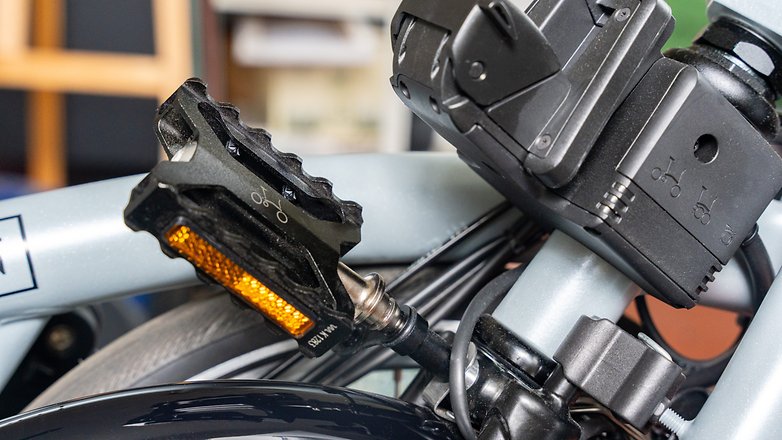
The Brompton Electric P-Line also comes with a removable battery which is attached to the front of the bike in a carrying bag. Experience has shown that Brompton has once again improved the battery connection. Failure of the electric motor on cobblestones, as I experienced with the C-Line, no longer occurs with the P-Line model.
Overall, the design of the e-folding bike is impressive to say the least. Having reviewed many electric folding bikes from other manufacturers over the past year, it is striking how well thought-out the Brompton design is. It folds within a minute, weighs several kilograms less than the alternatives, and the availability of spare parts is also far better despite the high costs.
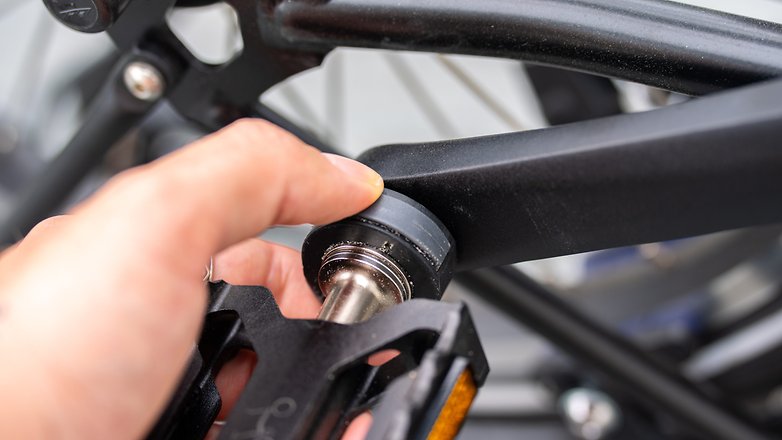
The only disadvantage I can think of is the imbalance when folded. Whether you prefer clip-on or folding pedals is a matter of personal preference. Let us move on to the real highlight of the Brompton Electric P-Line — the riding experience!
E-motor and riding pleasure
The Brompton Electric P-Line uses the same 250 W electric motor as the other Electric model. Once again, the manufacturer relies on a precise cadence sensor to regulate the motor power. Comfort during the ride is also ensured by a spring block that sits where the two folding bike halves meet.
Pros:
- Lively and powerful front motor.
- Support is well regulated via the cadence sensor.
- Rides almost like a conventional bike.
Cons:
- Saddle becomes uncomfortable on longer rides.
- 12-speed gears are only available at a higher price.
- Smartphone app doesn't offer too many advantages.
When I sat on a Brompton folding bike for the first time at the press event for the first Brompton Electric, I was surprised at how little the riding position differed from a conventional bike. I also observed the same effect on the P-Line model, which has a very similar seating position. This is not surprising, as dimensions of the frame are identical and the same applies to the handlebars on this model. Flatter handlebars, reminiscent of racing bikes or fixie bikes (read the electric Sushi Maki 3.0 fixie bike review), are unfortunately only available on non-electric Brompton bikes such as the Brompton T-Line.
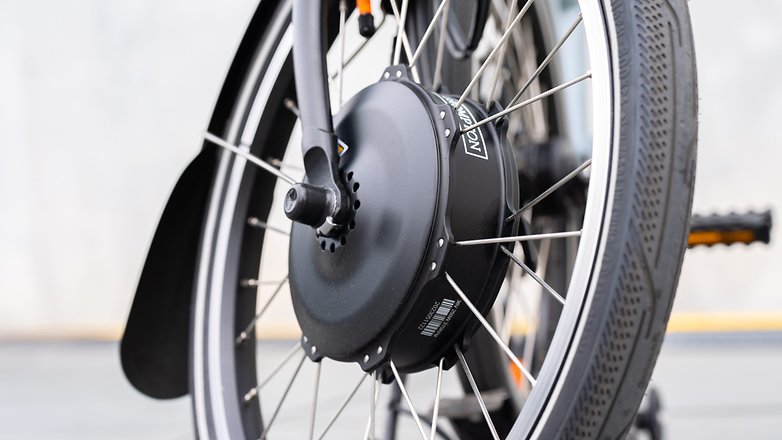
Compared to the previous Brompton review, it was exciting to try out the 12-speed gear system. You can change the gear ratio in three stages using your right thumb, and there are four more gears available on the left thumb. If you are unsure which gear is right for you, you should know the 12-speed version adds around 400 g of weight. This is certainly practical for riding on uneven terrain, but on flat areas, I normally used only the three gears on the right thumb. If I were to pick up the P-Line, I would prefer the 4-speed version which helps me save $200 in the process. Unfortunately, there is no 6-speed gearbox as a compromise for this model.
However, experience has shown that the transmission ratio is excellent with both the 4-speed and the 12-speed gear systems. When riding at 25 km/h, i.e. the maximum speed with motor assistance, pedaling speed was still very comfortable. Here, cheaper e-folding bikes such as the Jeep FR6020 (review) or the Rover FFR 701 without gears failed.
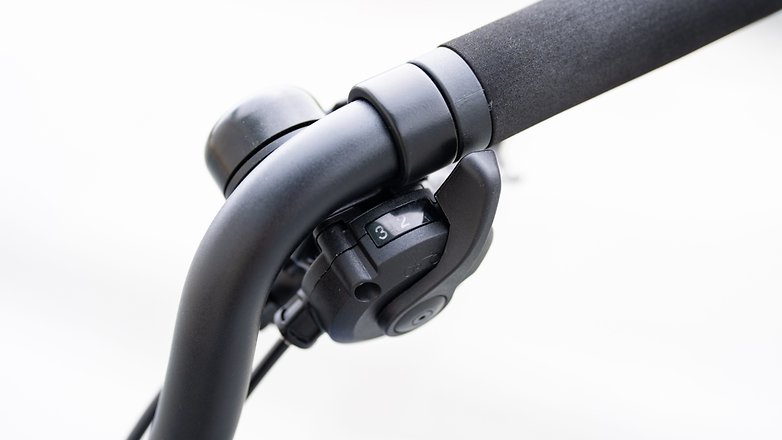
When riding on uneven terrain, the Electric models benefit from the powerful 250 W motor. This motor is located in the front wheel and therefore feels a little different to most of the other e-bikes. When starting, you will feel more like you're being pulled, but this turns out to be rather pleasant after a short period of getting familiar with it. The motor's power can be adjusted in three stages and via the fine cadence sensor at the bottom bracket. As with the C-Line model, this is an excellent piece of engineering thought as it allows you to precisely control thrust during assisted riding. The fact that the sensor is precise enough to remain at a certain speed is another plus point for the Brompton Electric P-Line.
Brompton also offers a companion app for smartphones for its Electric models. This is finally also available on Android and connects to the bike via Bluetooth. As a nice bonus, Brompton included a bike mount with the purchase for you to place your smartphone on the handlebars. The biggest advantage of this? You can view your speed and change the assistance levels without having to reach forward to fiddle with the battery. However, the app doesn't offer much more than that, and manufacturers like Cowboy do better with Google Maps integration. You can find out more in my Cowboy Bike C4 review.
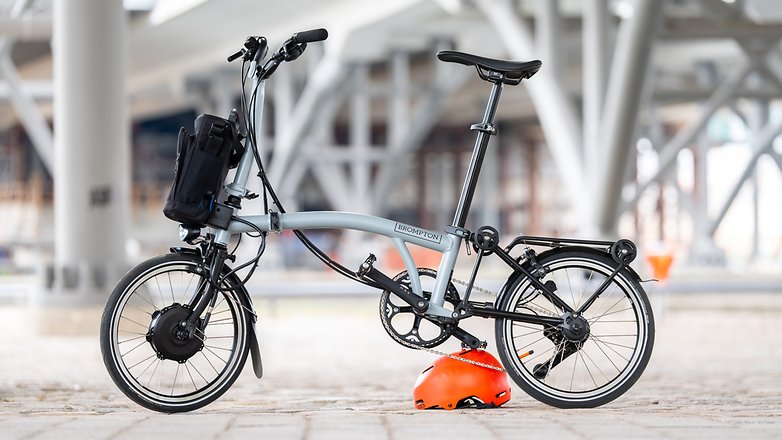
What I didn't like so much about the P-Line model was the comfort level of the saddle. This is because Brompton uses the Superlight model of its own Brompton saddle as standard. After approximately 45 minutes of riding, I felt increased pressure when sitting on the saddle, which became a little painful as the ride continued. I preferred the standard saddle on the C-Line better. Unfortunately, if you need to switch to a more comfortable saddle, you can only do so after purchasing the P-Line. I would welcome an option to change it before making my purchase.
Overall, the Brompton Electric in the P-Line rides almost identically to the manufacturer's older electric folding bike model. Once again, I was impressed by the power of the electric motor in the front wheel. It is fantastic how precise and comfortable the e-bike rides despite its tiny folding size. One drawback, however, is the uncomfortable saddle, which is more suitable for shorter commutes. Ah well, at least it shaved off some weight.
Range & charging
The range of the Brompton P-Line is 30-70 km - nothing has changed here compared to the older Electric model, despite the lighter weight. A full charge takes around four hours with the charger supplied. Brompton offers an optional quick charger that reduces the charging time to two hours.
Pros:
- Solid range for commuters.
- Quick charger reduces charging time to two hours.
Cons:
- Quick charger costs an additional $130.
On the P-Line, the battery sits in front of the handlebars in a carrying bag. I still think this system is brilliant, as it allows you to reduce the weight of the foldable bike by around 3 kg. You can then hang the bag over your shoulder and use it as a counterweight to the e-bike. Brompton also offers a larger bag as an option, which offers a little bit more storage space.
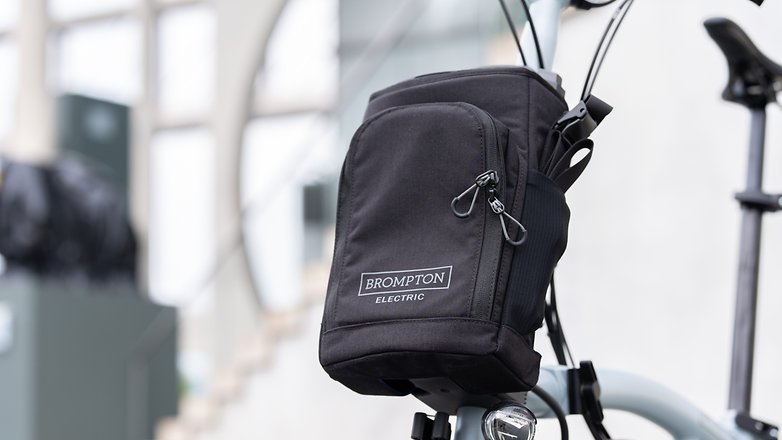
The range of the 8.55 Ah battery was specified by the manufacturer to be within 30 - 70 km. Here, the two Electric models from Brompton are on par. In reality, the range depends on the weight of the rider, terrain, support level, and the external temperature. Despite my slim 68 kg frame, my range during the review was closer to 30 km, but I always used the highest support level. Incidentally, Brompton specified a maximum load of 110 kg for the rider plus luggage.
Brompton uses a proprietary charger for charging, which takes four hours for a complete charge cycle. A fast charger is also available, but not in the US, which reduces the charging time to two hours. An additional battery costs a hefty $800. This makes it practical as the larger battery bag does not come with an integrated battery!
Technical specifications
Models & technical data
| Feature | 4-speed | 12-speed |
|---|---|---|
| Folding size | 645 x 585 x 270 millimeters (HxWxD) | 645 x 585 x 270 millimeters (HxWxD) |
| Weight | 15.9 kilograms | 16.3 kilograms |
| Max. maximum load | 110 kilograms | 110 kilograms |
| Brakes | Dual Pivot | Dual Pivot |
| Battery | 36 V / 300 Wh / 2.2 kilograms | 36 V / 300 Wh / 2.2 kilograms |
| Range | 30 to 70 kilometers | 30 to 70 kilometers |
| Sensors | Torque and cadence sensor integrated in the bottom bracket | Torque and cadence sensor integrated in the bottom bracket |
| Motor | BLDC front wheel motor with 250 watts rated power | BLDC front wheel motor with 250 watts rated power |
| Max. Maximum speed | approx. 25 km/h | approx. 25 km/h |
| Colors | Pop Lilac, Bronze Sky, Blue Bolt Laquer, Lunar Ice, Flame Laquer, Midnight Black Metallic | Pop Lilac, Bronze Sky, Blue Bolt Laquer, Lunar Ice, Flame Laquer, Midnight Black Metallic |
| Price | $4,750 | $4,950 |
Conclusion
Admittedly, I could have summarized this review as "Slightly lighter than the Brompton Electric of the C-Line, otherwise almost identical". On longer rides, the differences between the current Electric models from Brompton are really minimal. The use of titanium for the rear frame, a lighter saddle, and new clip pedals are minor changes that result in a rather remarkable weight reduction of 1.6 kg.
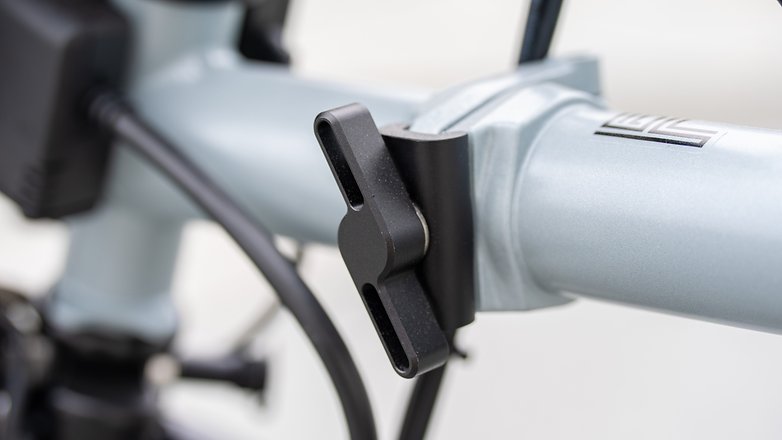
The fact that you have to pay an additional $200 for a lighter weight sounds crazy at first. However, many people buy expensive e-bikes like the Brompton Electric P-Line via installment payments or while it is on offer. Spread the price difference over 12 or 24 months, and the additional cost becomes less significant. Commuters, on the other hand, will definitely appreciate the lower weight when lugging it up and down staircases or when placing it in a vehicle trunk.
The P-Line is therefore the better option for everyday commuting. However, the weight reduction comes at the expense of comfort. I personally found the clip pedals to be more cumbersome in everyday use than alternatives that can be folded. However, the uncomfortable lightweight saddle is particularly annoying on longer rides. I would even be willing invest in a more comfortable saddle if I were to buy the P-Line Electric.
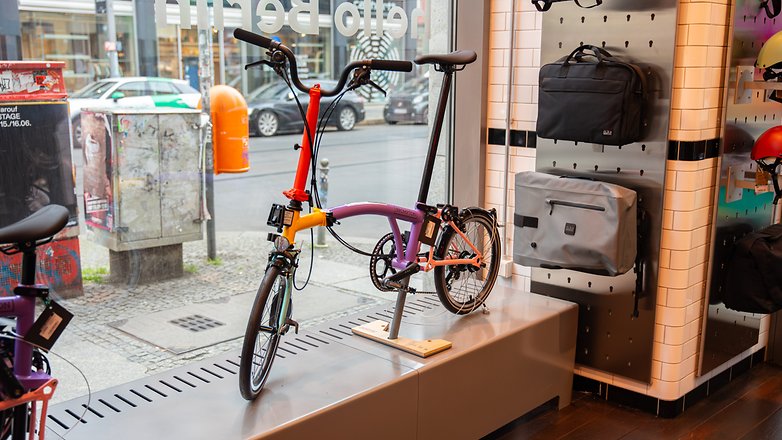
Apart from that, all the usual Brompton qualities were retained. The folding mechanism with its three handles is far more convenient and well thought-out than on other folding e-bikes. Details such as locking the folded bike by retracting the seat post or easier maneuverability thanks to the wheels attached to the luggage rack are unique selling points for Brompton. The front motor once again does an excellent job, with its 30-70 km range being perfectly suitable for everyday use.
